Animal Welfare Monthly Highlights: March 2025
Snares Classified to Strengthen Data on Anti-Bushmeat Efforts
De-snaring Patrols
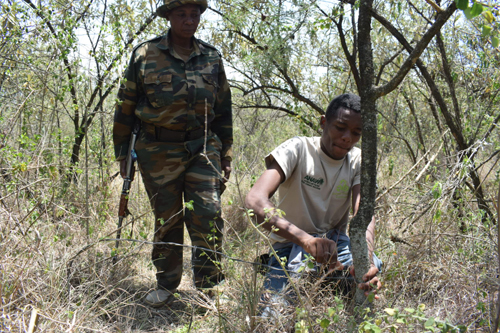
The development of science as an asset strengthens conservation efforts in Kenya in the recent decades. As de-snaring teams ventured out, they worked to categorize snares encountered. Each snare was classified based on its design and placement, with precise GPS coordinates recorded for future monitoring.
In a continued effort to combat illegal bush meat trade, a large-scale de-snaring operation was carried out in Machakos County from March 24 - 28, 2025. Led by Africa Network for Animal Welfare (ANAW) in collaboration with the Kenya Wildlife Service (KWS) and other conservation partners aimed to eliminate deadly snares, assist injured wildlife, and gather crucial data on poaching activities. Teams of conservationists, rangers, and local scouts patrolled high-risk areas, systematically identifying and dismantling snares.
The de-snaring operation conducted in Machakos County between 25-28 March 2025 resulted in the recovery of multiple live and dead snares. The team found 33 snares in Kwa Muambi Farm, 10 snares in Kyelu Ranch, 33 snares in Kavilila, and two snares in Kwa Muambi Farm.
These results highlight the widespread impact of illegal bush meat trade and the urgent need for sustained anti-poaching efforts. The high number of snares encountered emphasize the importance of ongoing monitoring and intervention to protect wildlife in the region.
The success of this initiative underscores the collective determination to protect Kenya’s wildlife from the threats of illegal hunting. By combining field operations with data-driven conservation strategies, stakeholders are working towards a future where wildlife can thrive free from human-induced harm.
Conservation Education
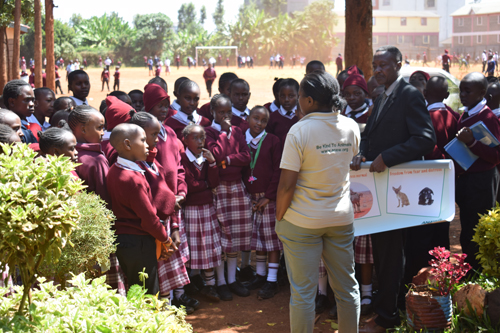
As part of ongoing efforts to promote wildlife conservation, Africa Network for Animal Welfare (ANAW), Kenya Wildlife Service (KWS) and Kapiti Base conducted an educational outreach program in Machakos County. The initiative which targeted students from Konza and Kyumbi Primary and Junior High Schools, aimed at cultivating a deeper understanding of wildlife conservation and animal welfare among young learners.
Recognizing the crucial role of the youth in safeguarding the environment, the team engaged students in discussions on the ecological significance of wildlife, the impact of illegal poaching, and the risks associated with bush meat consumption. Through interactive sessions, students learned about zoonotic diseases, habitat destruction, and the urgent need for responsible co-existence with nature.
The visit featured dynamic Question and Answer segments, storytelling, and engaged activities designed to make conservation topics relatable and impactful. Students actively participated, demonstrating enthusiasm and a willingness to contribute to wildlife protection efforts. The team encouraged them to take on ambassadorial roles by reporting illegal activities, raising awareness, and promoting sustainable practices within their communities.
Both students and teachers responded positively to the initiative, expressing keen interest in wildlife conservation and animal welfare. This outreach underscores the power of education in shaping a new generation of conservation advocates dedicated to protecting Kenya’s rich biodiversity.
Beach Patrols Continue in Efforts to Ensure the Conservation of Kenya’s Turtle
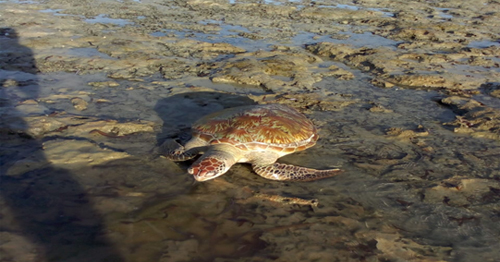
Being the month of Ramadhan, there were less activities involving turtle conservation in March. Funzi Turtle and Conservation Group conducted security patrols making observations on turtle activities in the area. There were no new nests laid during the month, but the team continued to safeguard one of the nests that was laid the previous month. There were no records of new nests for this month.
In collaboration with the community, the group in Msambweni organized one beach clean-up and continued raising awareness on dangers of waste and pollution towards marine animals. The group collected 260 kilograms of trash.
ACEF Evolves as Vocational Training for Vulnerable Youth is Established
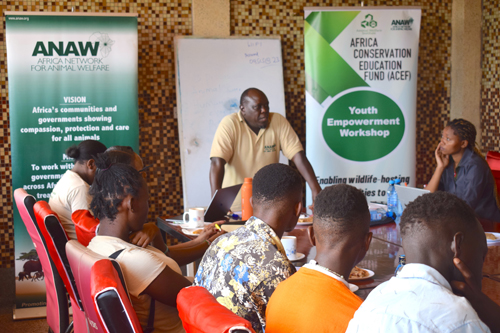
The First Cohort of Young Candidates Previously Shortlisted to Pursue Short Courses Attend the Youth Empowerment Workshop
The Africa Conservation Education Fund (ACEF) established the Vocational Training Project as one of the projects that will enable wildlife-hosting communities to be conservation agents through education and training. This project includes the first cohort of ACEF students, four in ANAW project areas - Shirango, Kasigau, Maungu and Voi, where potential young candidates were previously shortlisted to pursue short courses that would provide them with critical technical skills.
To proceed with the selection process, a team from ANAW conducted an orientation and youth empowerment workshop in Shirango area, Kilifi County on March 5 - 6, 2025. The workshop aimed at engaging the selected youths on the vocational training project prioritizing its relation to wildlife conservation and animal welfare. The productive sessions highlighted ANAWs work and its partners, and the project expectations. They worked towards ensuring that after the training, the selected youths would be equipped with skills that would provide alternative opportunities to wildlife and environmental exploitation.
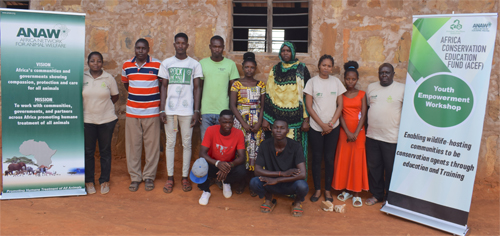
At the end of the workshop, the team engaged 17 participants - seven from Kilifi County and ten from Taita Taveta County. Participants shared relevant information on course applications and the learning institutions they would be joining and were educated on the project and its relation to conservation and animal welfare. Consent forms regarding the project and the participants’ involvement were signed and both participants and the ANAW team agreed on the way forward to gather information on the intake timeline for the placement process.
Colobus Twins Progress Well at Colobus Conservation
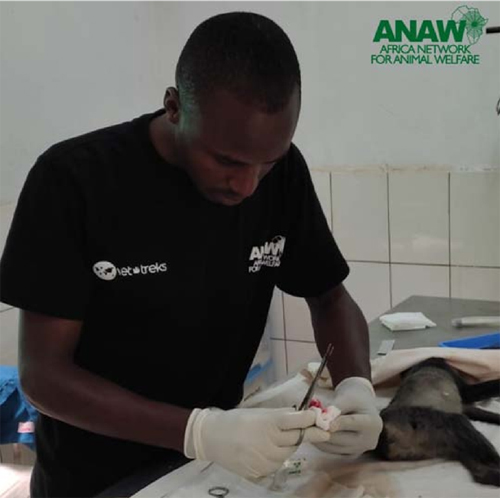
ANAW Veterinarian Providing Aid to an Injured Colobus Monkey
Colobus Monkeys twins are a rare occurrence. With the elation of these surprising tidings, the team at Colobus Conservation continue to ensure that they are being monitored, and it is reported that they are progressing well. In the same breath, a rescued Hadada Ibis was treated and released.
In the month of March, a total number of 15 animal welfare cases were attended to, including two Vervet Monkeys, seven Colobus Monkeys, four Sykes Monkeys, a Palm Civet and a Hadada Ibis.
Preparations Underway for Promoting Animal Welfare in Schools (PAWS) Project Evaluation
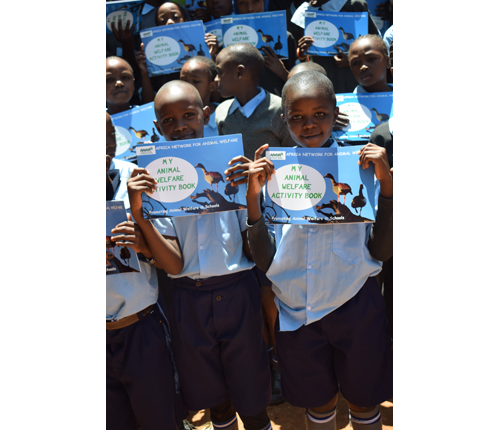
PAWS Materials Distributed to Pupils in Schools
The Promoting Animal Welfare in Schools (PAWS) program meetings where ten teachers were in attendance as the team prepared for the PAWS evaluation exercise. Appointments were also made in both intervention and control schools ahead of the evaluation. By the close of March, two evaluation exercises had been conducted in two schools and the distribution of PAWS materials was completed in the target schools.
Africa Network for Animal Welfare (ANAW) implements PAWS program through the Animal Welfare Clubs (AWC). The program includes design, production and distribution of teaching and learning materials, school visits, teachers’ training and workshops as well as embracing the use of creativity. Currently, the project is implemented in seven counties.
Support Our Work
Here's a great way to support Africa Network for Animal Welfare (ANAW) to protect present and future generations of animals. You can do so through the following ways:
Click Here to Donate
A Legacy in Your Will
By putting a bequest to ANAW in your will or trust, you will help us improve the lives of animals far beyond your lifetime. Contact Annastasia at This email address is being protected from spambots. You need JavaScript enabled to view it. if you need additional information about how to include us in your will.
